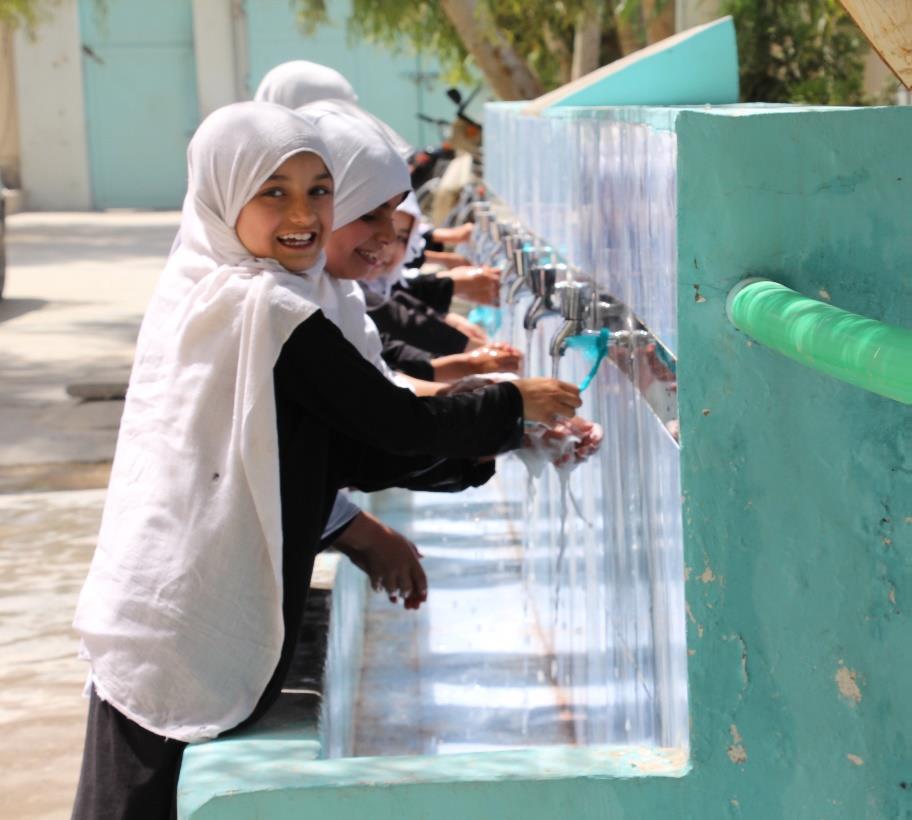Finland helps Afghanistan build better sanitation
Unicef’s Water Supply, Sanitation and Hygiene programme (WASH) has improved the quality of drinking water, sanitation and hygiene for hundreds of thousands of people in Afghanistan. Between 2017 and 2018, Finland contributed EUR 2 million to the programme.
In 2018, Unicef’s WASH programme in Afghanistan had a budget of USD 20 million. The majority of the funding from Finland, USD 1.6 million, was allocated to improving sanitation.
 Approximately 15,000 students gained access to the water and sanitation improvements carried out in schools in 2018. Photo: Unicef Afghanistan
Approximately 15,000 students gained access to the water and sanitation improvements carried out in schools in 2018. Photo: Unicef Afghanistan
Two-thirds of the budget was spent on development projects and the remaining third on humanitarian work. Last year, 1.9 million people received humanitarian aid through the WASH programme. The large share of the humanitarian aid was explained by the severe drought that affected Afghanistan last year. None of the Finnish funding was spent on humanitarian aid.
Diseases caused by contaminated water are the second most common cause of death for children under the age of five in Afghanistan. The lack of safe drinking water and sanitation combined with poor hygiene also help spread polio.
Dozens of polio viruses have been found in the slums around Kandahar, and Helmand province is also an area where polio is considered high risk.
In rural areas, one in five people do not have sanitation. For this reason, organic waste accumulates in their living environment and contaminates soil and water.
Nearly 200,000 people benefited from improved water supply in rural areas. The preferred technological solutions included solar-powered and gravity-fed pumps, taking advantage of the elevation differences in mountainous regions. The share of these new technologies increased to 81 per cent of all technological solutions used, significantly reducing the number of hand pumps.
Slightly over 20 per cent of the funding allocated to development aid was spent on sanitation improvements, with 526,000 beneficiaries. The programme’s aim is to meet the needs of the entire population by 2025.
Approximately 15,000 students gained access to the water and sanitation improvements carried out in schools last year. However, less than a third of them were girls. The new recommendations for helping girls stay at school during periods were therefore a significant achievement. The message “My menstruation should not be a barrier for my education” reached 315,000 girls and 840 female teachers in 22 provinces.
Some of the programme funds were allocated to water and sanitation rehabilitation and capacity building in health centres. Approximately 51,500 students and 1,100 teachers benefited from these hygiene improvements. Depending on the programme area, the project partners included three ministries: Ministry of Rural Rehabilitation and Development, Ministry of Education and Ministry of Public Health. Civil society organisations played a major role in implementing the improvements.
Implementation of Unicef’s WASH programme was possible in nearly all of the provinces, including those under Taliban’s influence.
In Afghanistan, the El Niño weather phenomenon brings exceptionally heavy snowfall, which in turn causes severe flooding in spring. For this reason, the share of humanitarian aid in the WASH programme may remain high in the coming years, which may undermine the results in the other programme areas.
Niko Heimola
The writer works at the Department for the Americas and Asia as the official responsible for development cooperation in Afghanistan. The figures are based on the Annual Report presented to the organisations funding Unicef’s WASH programme.